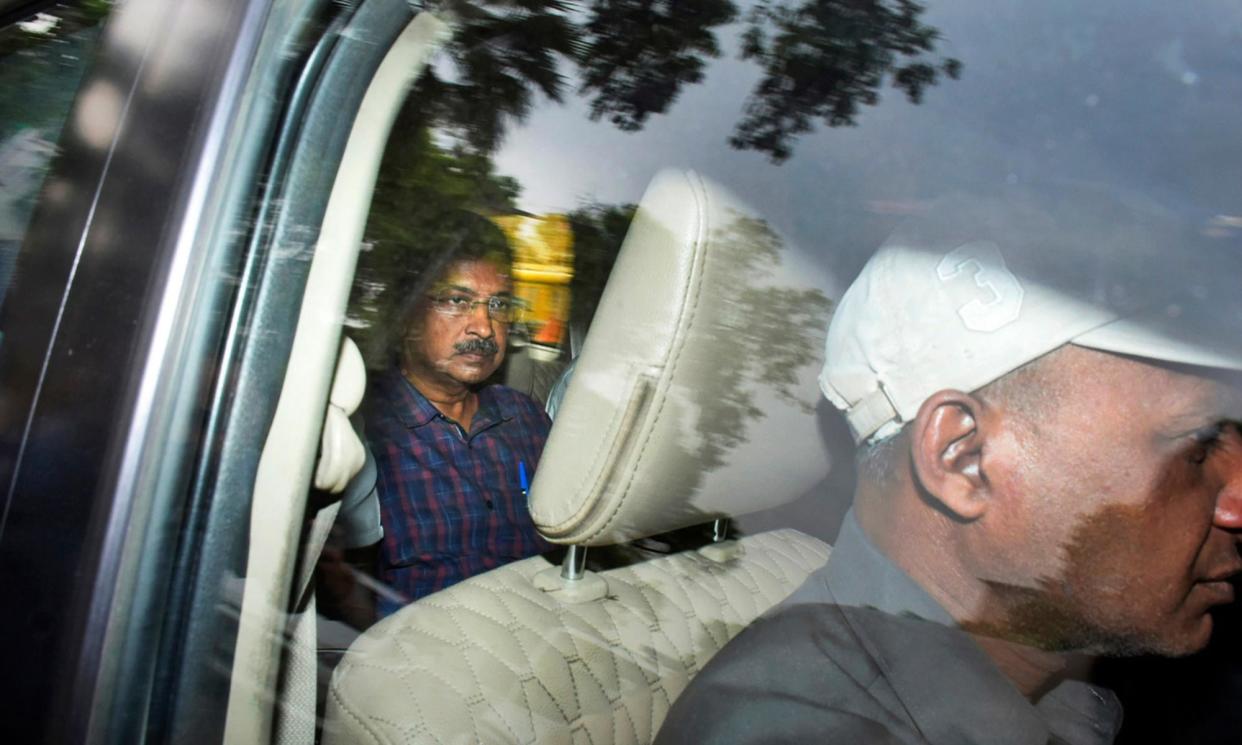Jailed Indian opposition leader granted bail to take part in election campaign

One of India’s best-known opposition leaders, Arvind Kejriwal, the chief minister of Delhi, has been granted bail by the country’s supreme court to allow him to take part in general election campaigningafter being kept behind bars for almost two months.
Kejriwal, who heads the Aam Aadmi party (AAP), has been held in jail since March when he was arrested on money-laundering charges. He has maintained that his arrest and detention was politically motivated to prevent him taking part in the election, which began in April and will continue until June.
Narendra Modi, the prime minister, and his ruling Bharatiya Janata party (BJP) are seeking a third term in power, and several opposition parties have accused the government of using tools of the state to go after them and undermine India’s democracy before the polls.
As he walked free from jail on Friday night after more than 50 nights behind bars , Kejriwal told his waiting supporters he wanted to “save the country from dictatorship”.
Last year, the AAP joined a coalition of dozens of opposition parties who came together under the acronym INDIA to fight the BJP in the election. Kejriwal’s release, which is until 1 June, will probably boost the opposition alliance and AAP, which has had to campaign for weeks without its figurehead. Saurabh Bharadwaj, a party leader, described the supreme court ruling as “more than a miracle”.
The AAP are contesting several seats across the country against the BJP, including in Delhi, where voting will take place on 25 May. Voting will continue till 1 June and then results will be counted on 4 June.
Related: Arvind Kejriwal: the Delhi chief minister jailed by Modi’s government
The case against Kejriwal was brought by the Enforcement Directorate (ED), a central government agency that is investigating the AAP over an alleged scam involving kickbacks from alcohol licensing deals. It alleges that Kejriwal was a “kingpin” in the corruption, which Kejriwal and the AAP have denied, calling the case a “political witch-hunt”.
The Modi government have denied any role in the case, stating that the ED is acting independently.
The ED had opposed granting Kejriwal bail but the supreme court judges questioned the timing of his arrest and concluded that he should be allowed to take part in the election campaign. Kejriwal, who was elected chief minister of Delhi in 2015, has been running the government from the city’s Tihar jail since his arrest in March.
Justice Khanna, who was hearing the case, said: “It is the election season. He is the elected chief minister of Delhi. The elections are around the corner. These are extraordinary situations. It’s not normal … He is not otherwise a habitual offender or somebody who has been involved in any other case.”
Khanna added: “He could have been arrested before or after [the election] also. Whatever it is, 21 days here or there should not make any difference.”
Other parties in the alliance have also alleged harassment by the BJP and the agencies under its control. The main opposition Congress party said its funds had been frozen by the tax authorities, while MPs in other parties have faced questioning and also been detained.
Kejriwal’s release was celebrated by several leaders in the INDIA coalition. Aaditya Thackeray, another key opposition leader in the bloc, said: “Arvind Kejriwal getting justice and relief against dictatorial regime in the country is a huge sign of winds of change.”

 Yahoo News
Yahoo News 
